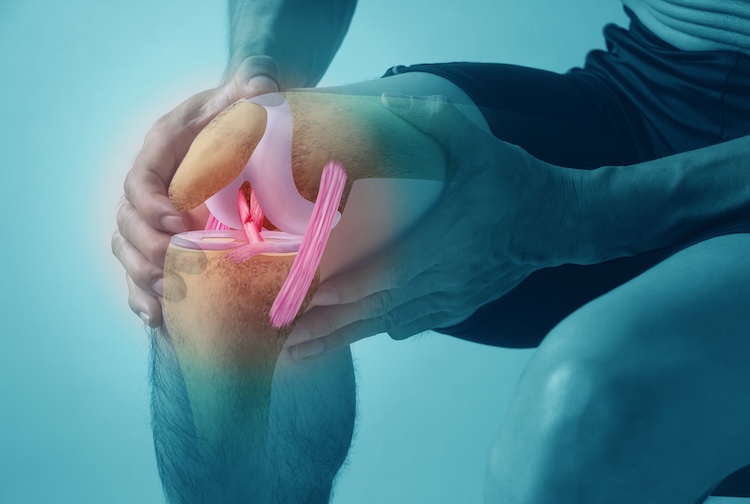Redefining the future of transplant medicine at VCU Health Hume-Lee Transplant Center
How VCU Health’s premier transplant center is giving more patients a second chance through transplant innovation.
October 23, 2025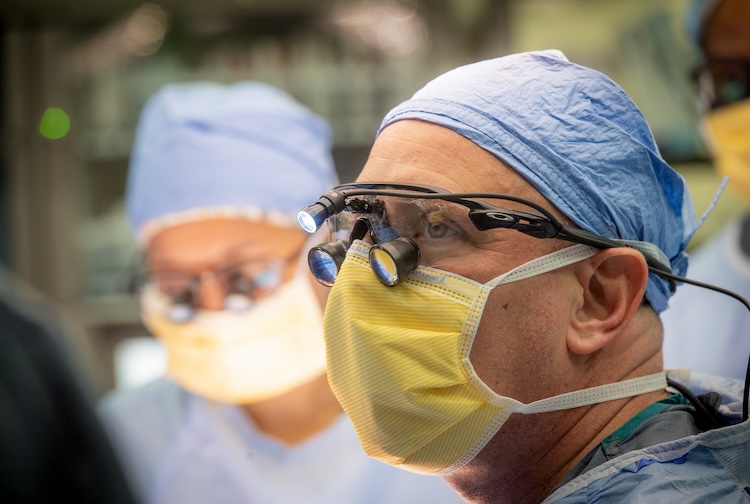 David Bruno, M.D., FACS, is the director of VCU Health Hume-Lee Transplant Center. (Allen Jones, Enterprise Marketing and Communications)
David Bruno, M.D., FACS, is the director of VCU Health Hume-Lee Transplant Center. (Allen Jones, Enterprise Marketing and Communications)
By Jeff Kelley
Disrupting the status quo is not a problem to be managed – it’s the driving force behind saving lives, the head of VCU Health Hume-Lee Transplant Center says.
“In this field, you can’t keep doing the same thing you did yesterday,” said David Bruno, M.D., FACS, the director of Hume-Lee Transplant Center. “There’s joy in offering a therapy that is a life-or-death treatment to a patient and their family, but that treatment is constantly evolving.”
In 2015, Marlon Levy M.D., MBA, the current CEO of VCU Health System and senior vice president for VCU Health Sciences, was brought to VCU as the chief of transplant. This move set into motion a complete revitalization of key programs meant to increase access for patients who are often racing against the clock to get care. These initiatives include relaunching the living-donor liver program and improving patient recovery through the addition of robotic-assisted surgeries.
The pancreatectomy with islet cell autotransplantation (or TP-IAT) program also started under Levy’s tenure. Hume-Lee is one of a handful of U.S. transplant centers that offer a last-resort treatment option for patients with chronic pancreatitis. The center is also leading the nation in research on this procedure and chronic pancreatitis’ effect on different patient populations.
The future of medicine is not about one specialty or one surgeon. It’s about building a multidisciplinary team focused on curing diseases.
David Bruno, M.D., FACS, director of VCU Health Hume-Lee Transplant Center
“Dr. Levy was able to offer this institution a real vision and deft management of people to get there,” Bruno said. “He managed to disrupt transplant, and disruption is one of the hallmarks of working in the transplant field.”
Now, as CEO, Levy continues to champion innovations to enhance patient care and training for current and future health care workers as head of the university-based health system. After Levy’s appointment in 2024, Bruno took the helm at Hume-Lee.
“VCU Health and Hume-Lee evolve with the transplant landscape because of the incredible team dedicated to advancing the field,” Levy said. “We aren’t afraid to be the first or push the envelope, especially when it means better outcomes for our patients.”
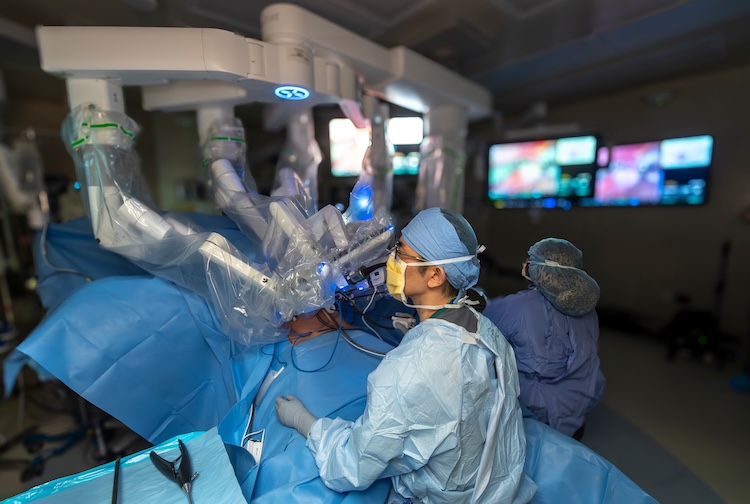
Yuzuru Sambommatsu, M.D., a Hume-Lee transplant surgeon, assists at the bedside of the living liver donor surgery being performed with the da Vinci robotic surgery system. (Allen Jones, Enterprise Marketing and Communications)
Since then, the transplant center continues to hit major milestones. In 2025, surgeons performed the world’s first living donor liver retrieval using the newest robotic technology. Hume-Lee was also the first center in the U.S. to perform a fully robotic liver transplant using a liver from a living donor. Both surgical achievements were led by Seung Duk Lee, M.D., Ph.D., the center’s surgical director of liver transplant.
Hope for high-risk transplant patients – Hume-Lee goes further when others can’t
Innovation isn’t limited to surgical technique — it extends to how the transplant care team thinks about second chances. Hume-Lee has earned a reputation as a center for second opinions.
“We don’t need to be your first resort,” Bruno said. “We’d like to be your second. We want to be the place doing things that other programs are uncomfortable doing — and doing it successfully.”
As part of a university-based health system, patients also benefit from the physicians and surgeons who perform transplant research focused on making transplants safer, more effective and available to more people. This includes opening the door to lifesaving organs once considered unusable.
For example, VCU researchers have studied and safely transplanted kidneys from hepatitis C-positive deceased donors into recipients who do not have hepatitis C. Under protocols developed at VCU, there is only a 4% chance of transferring hepatitis C to the recipient. They have also successfully performed transplants from donors that had both HIV and hepatitis C into recipients living with HIV, but without transferring hepatitis C.
VCU Health and Hume-Lee evolve with the transplant landscape because of the incredible team dedicated to advancing the field. We aren’t afraid to be the first or push the envelope, especially when it means better outcomes for our patients.
Marlon Levy, M.D., MBA, CEO of VCU Health System and senior vice president for VCU Health Sciences
Hume-Lee is a cornerstone of the Stravitz-Sanyal Institute for Liver Disease and Metabolic Health, which unites surgeons, hepatologists and researchers across VCU Health to accelerate progress in treating liver disease and metabolic conditions. Many of its leaders, including former Hume-Lee Medical Director of liver transplantation R. Todd Stravitz, M.D., helped build the foundation for this collaboration.
The partnership also extends Hume-Lee’s mission onto the global stage. “This is the epicenter of the clinical effort to abolish liver and metabolic disease in the world,” Bruno said. “It’s unprecedented. There’s nothing like it.”
At Hume-Lee, the liver transplant program is ranked in the top ten in the nation.
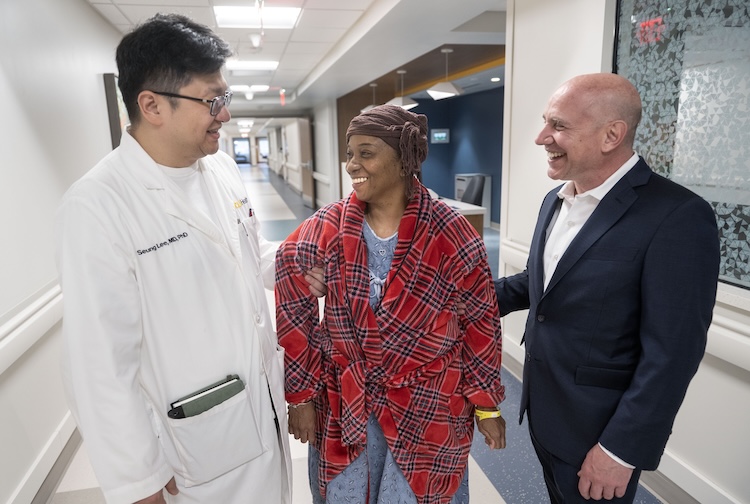
Seung Duk Lee, M.D., Ph.D., surgical director of liver transplant; Quanda Jordan and David Bruno, M.D., FACS, director of Hume-Lee Transplant Center. (Kevin Morley, Enterprise and Marketing Communications)
Earlier this year, Hume-Lee surgeons made medical history when they performed the first fully robotic living-donor liver transplant in the United States. One day after the operation, Quanda Jordan was already regaining her strength. The quick recovery was only achievable because of the minimally invasive innovations of her care team.
“I didn't feel a lot of pain,” she said. “I probably would have felt a lot more pain if the surgery was done the normal way.”
Quanda’s quick recovery also affirmed for her surgeon, Seung Duk Lee, M.D., Ph.D., Hume-Lee's liver transplant program surgical director who Bruno touts as arguably one of the best robotic surgeons in his field, what is possible for patients who need organ transplants and those who offer to donate a life-saving gift.
“I believe robotic surgery is the future,” he said. “Our vision is to expand access to living donor liver transplantation and to continually refine robotic techniques to make this operation even safer.”
Meeting the growing demand for lung transplant
In 2024, the transplant center began its launch of a new lung transplant program to meet the growing need for this specialty. Vipul Patel, M.D., was hired to establish the program, making it one of just three centers in Virginia that performs such transplants.
The need is huge. So, while it’s one of the more challenging programs to start, VCU Health and Hume-Lee leadership knew they were up for the task. The hard work is already creating new memories for patients like Ty McClain.
“Last year I couldn’t blow my birthday candles out. This year, I can,” Ty recalled. He was told he had months to live, but the doctors at Hume-Lee were willing to help him breathe well again. “I was determined to do this,” Ty said. “The life I had before wasn’t a life.”
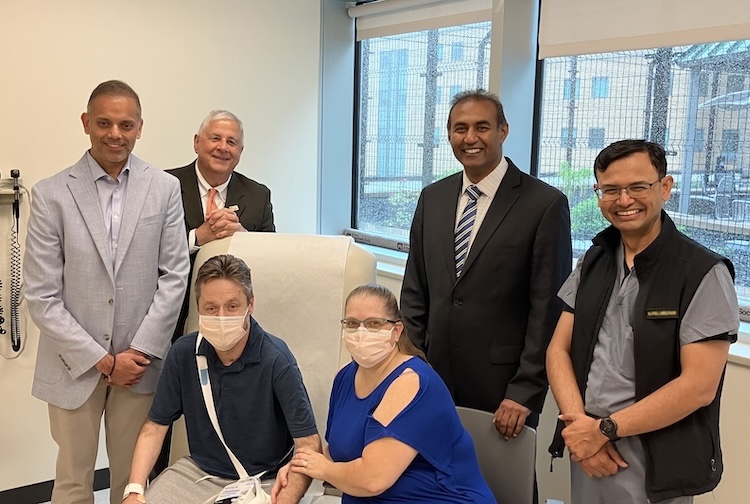
From left to right (back row): Z.A. Hashmi, M.D., Marlon Levy, M.D., MBA, Vipul Patel, M.D. and Nirvik Pal, M.D., with VCU Health patient Ty McLain and his wife, Tami McLain. (Caroline Ward, Enterprise Marketing and Communications)
Unlike other transplanted organs, lungs are exposed to bacteria and pollutants from the air, which makes them more likely to trigger an immune response. After transplant, they no longer get oxygen-rich blood from their original supply, making them more prone to inflammation and injury. Because of the deoxygenated blood and constant contact with germs in the air, lungs have a higher risk of rejection than other organs.
“Lung transplant is an awesome example of how we’re building a team, because that’s really something out of nothing,” Bruno said. “It’s a high-acuity transplant. Maybe it’s the highest acuity transplant. It’s a surgically complex operation. It requires precision care before and afterwards.”
Teamwork is the core of future transplant innovations
Hume-Lee’s strength is translating to more lives saved. The center recorded its busiest month ever in June 2025 (more than 70 procedures), and Bruno estimates that the center will perform just north of 550 organ transplants in 2025.
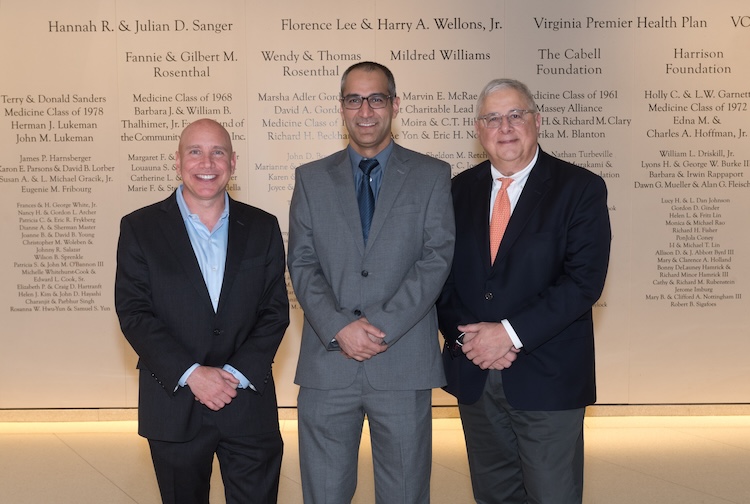
Former director Marlon Levy, M.D., MBA, started the TP-IAT program at VCU Health Hume-Lee Transplant Center. Left to right: David Bruno, M.D., FACS, director of Hume-Lee; Aamir Khan, M.D., TP-IAT medical director and transplant surgeon; and Levy, CEO of VCU Health System and senior vice president for VCU Health Sciences. (Thomas Kojcsich, Enterprise Marketing and Communications)
Centers are often limited in the number of surgeons and specialties they offer, eventually plateauing without further team growth or diversification of skillsets.
That difficult conundrum is not lost on Bruno. Investing in employees and fostering a culture of teamwork, he says, can drive change.
“The future of medicine is not about one specialty or one surgeon,” he said. “It’s about building a multidisciplinary team focused on curing diseases. If, when I’m done with this, we’ve created that team — a SEAL Team Six for health — then that’s what I’m looking for.”
And the success of Hume-Lee also lies in the other people: patients, donors and families.
“This isn’t just a place,” he said. “Hume-Lee is all of us, working together to give patients another chance at life.”
Inspired by this story? Read more about our patients and providers.




